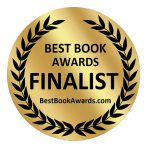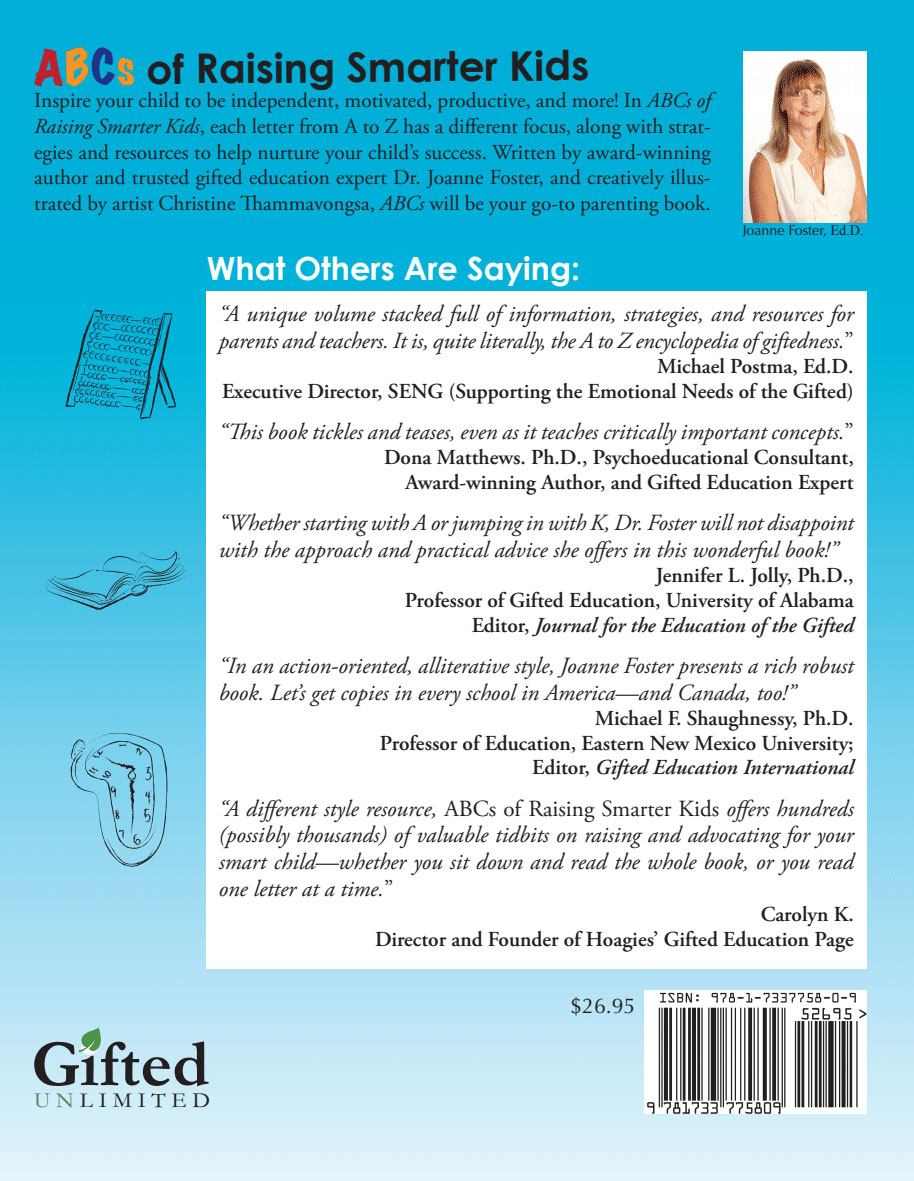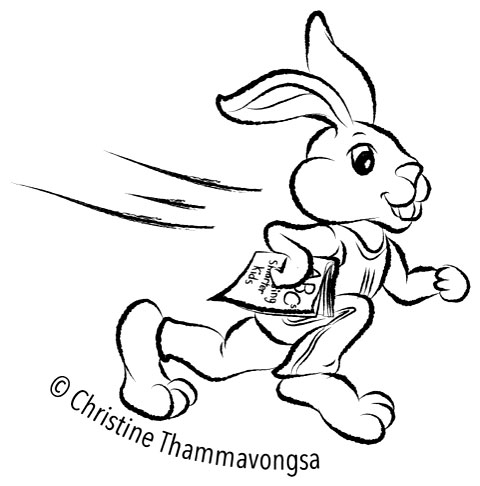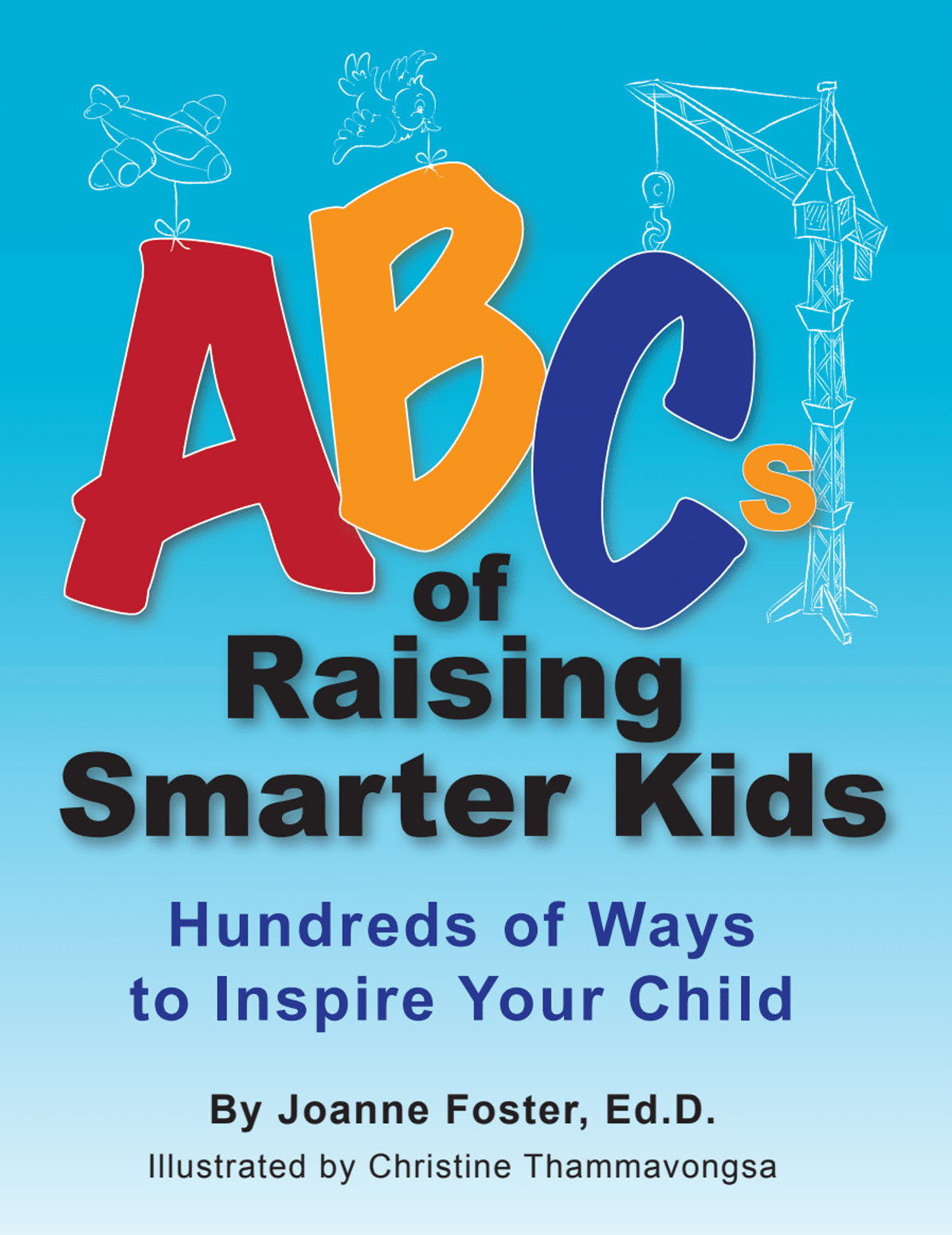ABCs of Raising Smarter Kids
BY Dr. Joanne Foster
This book provides hundreds of practical strategies and insights. Using a creative alliterative approach throughout, Dr. Foster takes readers on a journey through each letter of the alphabet, all the while discussing key aspects of child development and how to encourage children’s intelligence, creativity, and well-being. Illustrations by Christine Thammavongsa are clever, and they can be colored in! ABCs is an engaging, comprehensive guide for parents and educators alike—and kids will enjoy it, too!
For families, teachers, and caregivers!
ABCs of Raising Smarter Kids: Hundreds of Ways to Inspire Your Child
By Dr. Joanne Foster
Published by Gifted Unlimited.
Moving from A through Z, award-winning author Dr. Joanne Foster reveals hundreds of ways to encourage and support children’s abilities. She shares understandings based on decades of experience as a dedicated professional in the field of child development and gifted education, and she provides page after page of expertise, practical strategies, and relevant resources.
In ABCs of Raising Smarter Kids, each letter of the alphabet has a clear thematic focus (such as Awareness, Development, Independence, Learning, and Motivation). The ABC design differentiates this book from other parenting, gifted-related, and educational publications; the alliterative style makes the book unique; and the illustrations by artist Christine Thammavongsa are creative and thought-provoking. ABCs is a distinctive, engaging, and comprehensive book.
Dr. Foster shares insights and tips from this book—and from her many other books, articles, and publications—in presentations to parents and teachers in communities across North America, and around the globe.
Also available as an eBook.

Reviews for ABCs of Raising Smarter Kids
“Inspirational, fun, and savvy for parents and children discovering common ground while engaging their gifts and highest mind. The artwork is imaginative and joyous. A must read for the strategies and language to raise a bright kid.”
Nicole A. Tetreault, PhD
Neuroscientist
“A unique volume full of information, strategies, and resources for parents and teachers.”
Michael Postma, Ed.D.
Executive Director, SENG (Supporting the Emotional Needs of the Gifted)
Mona Delahooke, Ph.D.
Author of Beyond Behaviors: Using Brain Science and Compassion to Understand and Solve Children’s Behavioral Challenges
Michael F. Shaughnessy
Professor of Education, Eastern New Mexico University; Editor – Gifted Education International
“Foster will not disappoint in her approach and practical advice offered in this wonderful book!”
Jennifer L. Jolly, PhD
Professor of Gifted Education, University of Alabama; Editor – Journal for the Education of the Gifted
“This book tickles and teases, even as it teaches critically important concepts.”
Dona Matthews, PhD
Psychoeducational Consultant, Award-winning Author, Giftedness Expert
“Hundreds (possibly thousands) of valuable tidbits on raising and advocating for your smart child.”
Carolyn K.
Director and Founder of Hoagies
“ABCs of Raising Smarter Kids is that perfect resource.”
Lori Comallie-Caplan, MA, LMSW, LED
Counselor, Coach and Consultant for the Gifted; Parenting Coordinator and Family Law Mediator
“Fun, accurate and best of all approachable. You have taken such a beautifully human approach.”
Sharon Duncan
Gifted Consultant – Gifted Identity & Gifted Research and Outreach (GRO)
“For anyone with hundreds of questions about how to support the bright children in their care.”
Deborah Ruf, PhD
Gifted Education Expert and Award-winning Author
“ABCs of Raising Smarter Kids provides insightful strategies and resources to help parents foster children’s intelligence and nurture core strengths.”
Marilyn Price-Mitchell PhD
Developmental Psychologist
“Thoughtful, intelligent advice on so many fronts.”
Barb Wiseberg
Parent, Community Leader, and Gifted Education Advocate
“A useful, practical resource, with helpful advice for all stages of childhood. This is the kind of book you will read and revisit regularly. Should be on every parent’s night table!”
Nancy Kopman
Composer, Educational Children’s Music
“New approaches and opportunities to raise smarter kids!”
Sara Dimerman
Psychologist/Author
“The format is so unique and creative, and very user friendly. The drawings are whimsical and wonderful.”
Rina Gottesman
Artist
“Such an easy and insightful read, from beginning to end.”
Heather Sherman
Parent, Television Producer, and Journalist
“A treasure trove. Reach in, choose a page, and come out with golden nuggets every time.”
Lisa Sansom
Coach, Consultant. Master of Applied Positive Psychology (MAPP)
“Nicely packaged in an easy-to-read format. Filled with fun facts, ample alliteration, and “xtraordinary xamples,” this book provides guidance galore and rich resources.”
Ed Amend, PsyD
Clinical Psychologist and Award-winning Author
“I truly think the ABC approach to this book is inspired. Wonderful information.”
Marianne Kuzujanakis – M.D. (Paediatrician) M.P.H.
Co-author of Misdiagnosis & Dual Diagnosis of Gifted Children & Adults (2nd edition)
“Awesome Book! I love the easy layout, and being able to engage kids at the same time! Joanne Foster sure knows how share her skills as an educator, author, and parent. Thank you so much for helping us build a better world by raising kids who are insightful, thoughtful, resourceful, and community-oriented.”
Ruby Silvertown
Business Entrepreneur, Parent, and Grandparent
“WOW!!! What an amazing compilation of recommended resources for parents confronted with the challenging frontier of raising children.”
Marlaine Cover
Social Entrepreneur, Founder Parenting 2.0
“Whether you’re hunting for information on a specific topic or just pondering how to be the best parent you can be for your particular child, this warm and wise volume has much to offer.”
Dr. Eileen Kennedy-Moore
Psychologist, and Author of “Kid Confidence” and “Growing Friendships”
“My favorite aspect of the book is that every step is ready to implement seamlessly into family life, community life and school. You’ll pick this book up again and again just to peruse its treasure troves! I highly recommend it to every parent.”
Sarah Chana Radcliffe
Author of “Raise Your Kids without Raising Your Voice”
Table of Contents: A “Letter Guide” for Parents
Introduction
A is for Awareness
B is for Basics: And the B Goes On…
C is for Clarifying Complexities (I Can C Clearly Now)
D is for Development
E is for Education
F is for Fit and Flexibility
G is for Gifted
H is for Health and Happiness
I is for Independence and Initiative
J is for Journey
K is for Kindling
L is for Learning
M is for Motivation
N is for Nurturing
O is for Opportunities
P is for Productivity
Q is for Questions
R is for R We There Yet? Reflecting upon Parents’ and Teachers’ Roles
S is for Supporting
T is for Tips for Working with Teachers
U is for Understanding
V is for Viewpoints
W is for Wondering and Well-Being
X is for Xtending the Gifted Xperience
YZ is for Youthful Zeal
Bibliography
Footnotes
Acknowledgments
About the Author
About the Illustrator
Excerpts from IGNITE YOUR IDEAS: CREATIVITY FOR KIDS
By Dr. Joanne Foster
A Is for Awareness
B Is for Basics
C Is for Clarifying Complexities
For more ABCs – and to see hundreds of strategies and resources from D through Z, see the book ABCs of Raising Smarter Kids.

Parenting Book Club Material: Two Different Options!
For info on parenting book clubs, check out this link: Reading—and Parenting Book Clubs
HERE’S OPTION ONE FOR ABCs
Consider one or more of the following 7 excerpts from ABCs of Raising Smarter Kids by thinking about the message conveyed in relation to these 3 questions:
- Do you agree with the quote? Why or why not?
- What aspects of the quote resonate most strongly for you?
- How can you apply the information to support and encourage your child’s development?
Or alternatively, select a quote of your choice from the book. Discuss the three questions, the possibilities that come to mind, or the significance.
Excerpt #1.
“The time is ripe to consider with greater refinement and depth how to develop better educational programs, advocate for change where needed, clarify terms, make meaningful connections, share perspectives, applaud diversity, build cohesive plans, and turn visions into realities.”
~ ABCs of Raising Smarter Kids, p. xv
Excerpt #2.
“Success in life depends on being able to get along with people, and empathy is integral to that. However, it is not a trait that is inborn. Like intelligence, empathy must be cultivated from an early age. Many would argue that empathy is every bit as important as intelligence, if not more so, because it affects well-being, health, relationships, resilience, and future happiness.”
~ ABCs of Raising Smarter Kids, p. 37
Excerpt #3.
“The traditional approach of identifying, labeling, and then segregating children on the basis of general intelligence or academic test scores (usually based on performance at a single point in time), is very hard to defend. A child’s learning needs are better determined by means of multiple measures, including ongoing assessment that is individually responsive, integrated into instruction, and subject-specific. (That said, standardized tests can be useful for providing additional information and objective confirmation of teacher judgment and other assessment data.)”
~ ABCs of Raising Smarter Kids, p. 45
Excerpt #4.
“Try not to push too hard. Learning, creative expression, and productive engagement are like embarking upon quests that take time, effort, and patience. Appreciate when time is of the essence—and when a little forbearance or flexibility might go a long way. (What’s the rush?)”
~ ABCs of Raising Smarter Kids, p. 77
Excerpt #5.
“Children may be inclined to rely on their parents when difficulties arise. The extent of their dependence will differ at various age and maturity levels, and in relation to context and circumstances, including time and place. Reliance is okay, to a point. Umbilical cords are supposed to be cut. Help children forge their way toward autonomy.”
~ ABCs of Raising Smarter Kids, p. 86
Excerpt #6.
“Teacher training and professional development focusing on gifted-related learning requirements should be an ongoing part of every educator’s learning curve. This includes content that will help teachers learn to refine materials, instruction, assessment methods, goals, and other ways to better support and encourage children’s high-level development, and also their diverse social, emotional, motivational, and other needs.”
~ ABCs of Raising Smarter Kids, p. 137
Excerpt #7.
“Each person chooses what to cultivate, reveal, share, or convey, be it through words, art, music, dance, or even silence. So, be careful not to make assumptions about the capabilities of others, or for that matter, yourself. Remember, what people show, communicate, or do is not necessarily reflective of all they’re capable of, or all they know.”
~ ABCs of Raising Smarter Kids, p. 161
Here is option two for ABCs:
Questions Parents of High-Ability Learners Can Ask Themselves
Here is a list of a dozen important questions for parents to consider. These are not just simple yes/no questions (which would tend to generate simple yes/no answers). Rather, they are “in what ways” questions, designed to help parents think about how they’re already being supportive, and what they might want to consider going forward.
- In what ways do I demonstrate that I am an active and attentive listener?
- In what ways do I demonstrate resilience, perseverance, and a healthy perspective on the ups and downs of daily life?
- In what ways do I pay attention to the different factors that could have an impact on my children’s cognitive, emotional, social, or behavioral development?
- In what ways do I try to ensure that my children are appropriately challenged at school?
- In what ways do I regularly seek information about high-level development?
- In what ways do I expose my children to experiences that encourage play, exploration, sharing, communication, independence, and learning—in response to their individual abilities, interests, and needs?
- In what ways do I foster my children’s social skills and emotional development?
- In what ways do I advocate for the most appropriate academic opportunities (ones that suit domain-specific levels of advancement) for my children and others?
- In what ways do I encourage my children to self-advocate for their own educational needs?
- In what ways do I collaborate with teachers, consultants, other parents, and members of the community to create robust and engaging learning environments?
- In what ways do I encourage my children’s creative expression?
- In what ways do I celebrate my children’s successes with them?
Most importantly, parents can question their own assumptions, inferences, and perceptions. They can also explore how to strengthen their own support networks, how to look after themselves better, and how to continue strengthening the parent-child relationship.
~ ABCs of Raising Smarter Kids, pp. 120-121
Kids are Asking: Can I Read ABCs, Too???
The short answer is, “Yes!”
ABCs of Raising Smarter Kids can offer a meaningful reading experience for older children. Leave the book where they can find it, and poke through it—and let the learning begin! And, here are several suggestions for reading this book with kids. (It’s as easy as ABC!)
A – Acknowledge. The book’s colorful cover design appeals to children. Acknowledge that although ABCs of Raising Smarter Kids is written primarily for adults, it contains information that will also interest kids. Encourage them to flip through the pages to see what grabs their attention.
A – Attention. There are 26 different chapter themes, so attending to all the topics may be overwhelming. Pick one or two letters and go from there. What ideas do kids agree or disagree with? What might they add? What would they like to tell or ask the author? (I welcome comments!)
A – Alliteration. The book contains hundreds of alliterative points. Help kids see the fun that can be had with words and language. What can they learn from this?
B – Back and forth… The book does not have to be read straight through from A to Z. Children can jump around from page to page to discover ideas or strategies to try.
B – Build. There are many suggestions and resources within the book. Create a list together of tips, references, or links that are particularly well-suited to your child or your family.
B – Bond. Kids can choose to read whatever parts of the book they like, then benefit by sitting down with parents to have a chat about bits or pieces—and to consider one another’s views.
C – Color. An illustration accompanies each letter. These pictures can be colored in! Children can make the book even more unique with the addition of colorful shading or more detail.
C – Creativity. Children can choose to be creative by adding their own drawings (or points) to any letter they wish. They can find spots and let imagination guide the way.
C – Collaborate. Kids can share with friends what they read, draw, write, think about, or learn.
What is the target audience for this book?
ABCs of Raising Smarter Kids is geared primarily for parents and families, although teachers and caregivers will also find lots of pertinent information. However, kids can also read and think about the topics, and they can exercise their creativity by coloring in the illustrations, making the book uniquely theirs!
What is the main focus of this book?
Letters of the alphabet provide jumping-off points for 26 hot-button topics. For example, A is for Awareness; H is for Health and Happiness; M is for Motivation; O is for Opportunities; P is for Productivity; and U is for Understanding. Each chapter contains lots of headings—written in alliterative format—enhanced by many practical strategies for nurturing children’s learning, development, and well-being.
How many pages are there in this book?
There are 186 pages in ABCs of Raising Smarter Kids.
Why is Dr. Foster qualified to have written this book?
Dr. Foster has a Doctoral degree in Human Development and Applied Psychology. Her work has always been about “fostering kids’ success,” and supporting children’s and teens’ optimal growth. In ABCs of Raising Smarter Kids, she discusses matters that are paramount for parents, and she knows this because she has decades of experience as a parent, teacher, consultant, and child advocate, working with families and communities around the globe.
What supplementary resources can readers find within this book?
ABCs of Raising Smarter Kids contains a bibliography with hundreds of references (pp. 169 – 176), and endnotes with lots of links to pertinent resources (pp. 177 – 182).
What kinds of reviews has this book received?
Reviews of ABCs are great—and this book is recognized as being unlike any other because of the melding of its original alliterative format, unique pictures, and relevant content. Comments include words like “perfect resource,” and “insightful,” and “whimsical and wonderful,” and “reassuring,” and “robust,” and “treasure trove,” and “warm and wise.” There are many reviews under the “Reviews” tab on the ABCs page. ABCs of Raising Smarter Kids was an award-winning finalist in the Parenting/Family category of the 2019 Best Book Awards.
Are there any illustrations or charts in this book?
Yes! ABCs of Raising Smarter Kids has 26 beautiful and very creative illustrations by the talented Christine Thammavongsa. Each picture features interesting characters, and the artwork aligns with the alliterative theme of the letter it represents. Kids can showcase their creativity by coloring these in for fun!
How can I see samples of the content of this book?
There is an “Excerpts” tab on the ABCs of Raising Smarter Kids book page on this website.
Is there a book club guide or other online material that supplements this book?
Yes! Dr. Foster provides a complementary resource with two book club options for parents. Readers can discuss targeted excerpts from the book, or they can consider several questions that parents of high-ability learners can ask themselves. Moreover, there’s a supplementary resource geared for kids so they can engage with the book’s material, learn about alliteration, color in the illustrations, bolster their creativity, and collaborate with family and friends as they read through the various chapters. The book club resource and the one for kids are available on the ABCs page of this website.
Related Blog Posts
Powering Through Change: Tips For Kids
Change is inevitable. However, it can be challenging! This blog provides self-motivating strategies children and teens can think about, act upon, and share with others. And, parents can encourage all these suggestions!
Summer Qualms? Supporting Kids In Times Of Change
Changes in routines and social situations are inevitable—for example, when the school year ends, or at holidays. Such transition times can be difficult for lots of children. Here are 7 tips for parents to help facilitate smooth change processes.
A Little Negotiation Can Go A Long Way
Maxine creatively negotiated her grade by combining her original rhymed book report with a conventional one, demonstrating the power of respectful dialogue and compromise in resolving academic disagreements.










